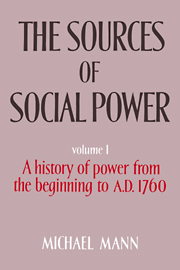Book contents
- Frontmatter
- Contents
- Preface
- 1 Societies as organized power networks
- 2 The end of general social evolution: how prehistoric peoples evaded power
- 3 The emergence of stratification, states, and multi-power-actor civilization in Mesopotamia
- 4 A comparative analysis of the emergence of stratification, states, and multi-power-actor civilizations
- 5 The first empires of domination: the dialectics of compulsory cooperation
- 6 “Indo-Europeans” and iron: expanding, diversified power networks
- 7 Phoenicians and Greeks: decentralized multi-power-actor civilizations
- 8 Revitalized empires of domination: Assyria and Persia
- 9 The Roman territorial empire
- 10 Ideology transcendent: the Christian ecumene
- 11 A comparative excursus into the world religions: Confucianism, Islam, and (especially) Hindu caste
- 12 The European dynamic: I. The intensive phase, A.D. 800–1155
- 13 The European dynamic: II. The rise of coordinating states, 1155–1477
- 14 The European dynamic: III. International capitalism and organic national states, 1477–1760
- 15 European conclusions: explaining European dynamism – capitalism, Christendom, and states
- 16 Patterns of world-historical development in agrarian societies
- Index
12 - The European dynamic: I. The intensive phase, A.D. 800–1155
Published online by Cambridge University Press: 26 December 2009
- Frontmatter
- Contents
- Preface
- 1 Societies as organized power networks
- 2 The end of general social evolution: how prehistoric peoples evaded power
- 3 The emergence of stratification, states, and multi-power-actor civilization in Mesopotamia
- 4 A comparative analysis of the emergence of stratification, states, and multi-power-actor civilizations
- 5 The first empires of domination: the dialectics of compulsory cooperation
- 6 “Indo-Europeans” and iron: expanding, diversified power networks
- 7 Phoenicians and Greeks: decentralized multi-power-actor civilizations
- 8 Revitalized empires of domination: Assyria and Persia
- 9 The Roman territorial empire
- 10 Ideology transcendent: the Christian ecumene
- 11 A comparative excursus into the world religions: Confucianism, Islam, and (especially) Hindu caste
- 12 The European dynamic: I. The intensive phase, A.D. 800–1155
- 13 The European dynamic: II. The rise of coordinating states, 1155–1477
- 14 The European dynamic: III. International capitalism and organic national states, 1477–1760
- 15 European conclusions: explaining European dynamism – capitalism, Christendom, and states
- 16 Patterns of world-historical development in agrarian societies
- Index
Summary
It is impossible for the historical sociologist to contemplate medieval European history “on its own term” without being influenced by premonitions of the Leviathan that was to loom up behind it – industrial capitalism. Little defense is needed for this teleological bias. It is justified by four factors.
First, the capitalist revolution in agriculture and industry of the eighteenth and nineteenth centuries was the single most important boost to human collective power in history. Industrial societies no longer depended almost entirely on the expenditure of human and animal muscle. They could add the exploitation of nature's own energy sources. In all the infrastructural measures of collective power used in these volumes – in yield ratios, population densities, extent of interaction networks, destructive powers, and so forth – an unparalleled quantum leap occurred in this short time.
Second, we can discern movement toward this leap forward gathering force through the whole medieval and early modern period. Setbacks occurred, but the checks did not last long before the forward movement resumed.
Third, all the sources of social power – economic, political, military, and ideological relations – tended to move in a single general direction of development. It is conventional to describe this movement as the “transition from feudalism to capitalism.” I shall argue that this is an insufficient description (as does Holton 1984 in concluding his valuable review of debates about the transition), but it nevertheless conveys the sense of an overall movement.
- Type
- Chapter
- Information
- The Sources of Social Power , pp. 373 - 415Publisher: Cambridge University PressPrint publication year: 1986



